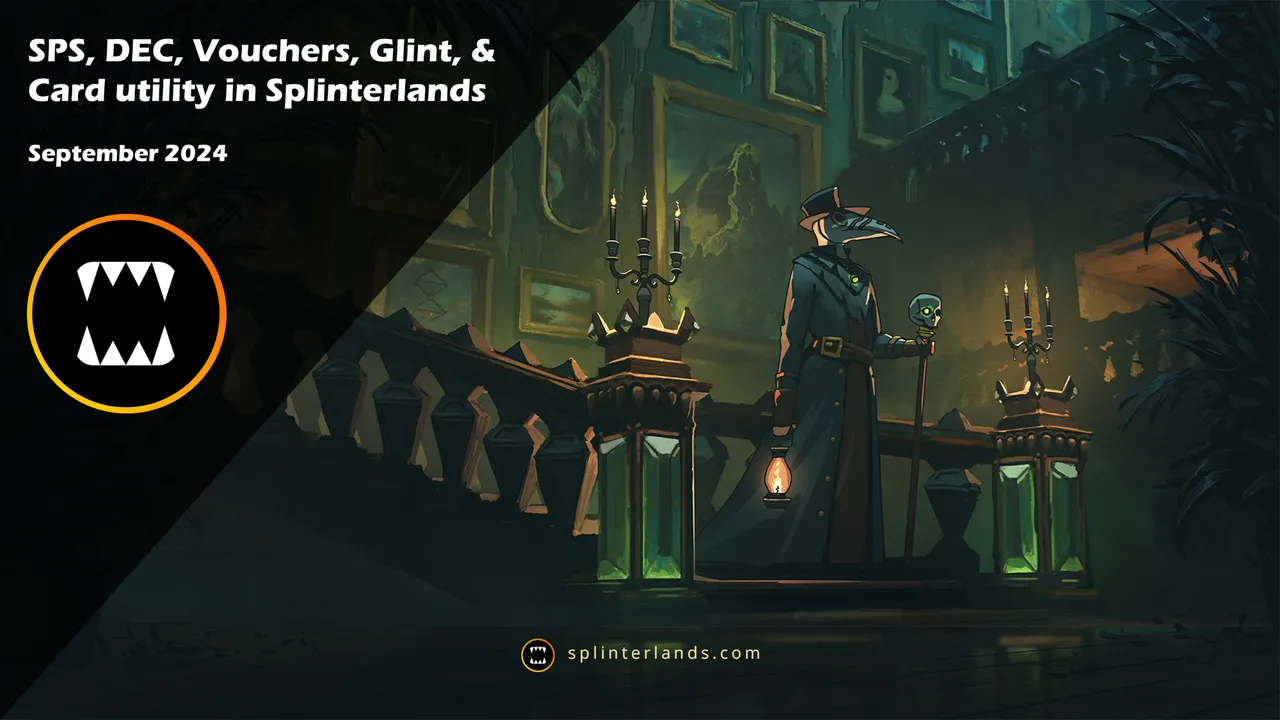
Splinterlands Asset Utility - SPS, DEC, Vouchers, Glint, and Cards (September 2024)
This post gives a September 2024 update on the utility of various assets in @splinterlands. As before, I itemize the utilities of the fungible assets ($SPS, $DEC, Vouchers, Glint, and Cards).
Understanding the Splinterlands Economy
Splinterlands has 2 primary tokens: $SPS (Splintershards) and $DEC (Dark Energy Crystals). $DEC is designed to be the primary in-game currency, while $SPS is the governance token and also designed to be the token required in order to maximize rewards from the game.
Vouchers are a semi-fungible token (explained in more detail below). It is primarily used to purchase exclusive items from the recently released "Voucher" store (marked as "Exclusive" within the Shop section).
Glint is a soulbound currency, earned from winning battles in Splinterlands and used within the Glint shop.
Cards are the playable assets within the game.
$SPS (SplinterShards) Utility:
- Staking rewards: Staking SPS provides rewards in the form of SPS and Vouchers. Based on current prices and rewards, the SPS staking APR is ~11.4%.
- Ranked rewards boost: In order to maximize battle rewards (SPS and Reward Shares), players must stake SPS. The current requirements are explained in detail here.
- Delegation: SPS can be delegated to other players to support their staking requirements, and a marketplace is also available which gives SPS stakers the ability to temporarily lend out their SPS in exchange for DEC. Delegating & lending SPS does not reduce staking rewards, but it does reduce the SPS staking available for the lending player's rewards boost. At the time of writing, SPS can typically be rented for ~0.002 DEC/SPS/day, which translates to a 7.81% APR on SPS rentals.
- Burn for DEC: One of the most important utilities of SPS is its ability to be burned for DEC at a rate of 975 DEC per dollar of SPS. SPS burned this way is gone forever (i.e. DEC cannot be burned to recover the SPS). This mechanism is explained here. So far, >61.7M SPS has been burned for DEC (~2% of maximum supply of SPS that will ever be created). When DEC is below its intended peg of 1000 DEC for $1, this SPS->DEC burn mechanism isn't used heavily, while when demand for DEC is high and it approaches its peg the incentive is increased (above the peg, there would be an arbitrage opportunity, which means it's unlikely DEC would ever stay above peg for long).
- Tournament staking requirements: Most tournaments require players to have a minimum amount of SPS staked to enter. The bigger the rewards in a tournament, the higher the requirement.
- Buy validator nodes: Validator Nodes are priced at a fixed US dollar value but are purchased with SPS. 80% of the SPS used to buy nodes is burned while the remaining 20% is allocated to the DAO. Details on Validator Nodes can be found here.
- Governance: SPS is the only way to participate in governance proposals in the Splinterlands ecosystem. So far >170 proposals have gone to an official vote. "Voter turnout" (the % of staked SPS voting for any given proposal) varies quite a bit depending on how contentious a proposal is, but frequently reaches ~50% (not so different from the voter turnout, for example, of US presidential elections).
- Soulkeep rewards boost (TBA): This functionality is not live yet, but was something which the Splinterlands and Double Coconut team had both indicated would be the case.
DEC (Dark Energy Crystals) Utility:
- Buy cards & assets on marketplace: DEC is the primary currency used to make card or other asset purchases in the card and asset marketplaces. In the past 3 months, daily card sales hover between 5000-10000 cards/day, and volumes of $5-20k/day. You can find a terrific chart showing daily card sales on peakmonsters.
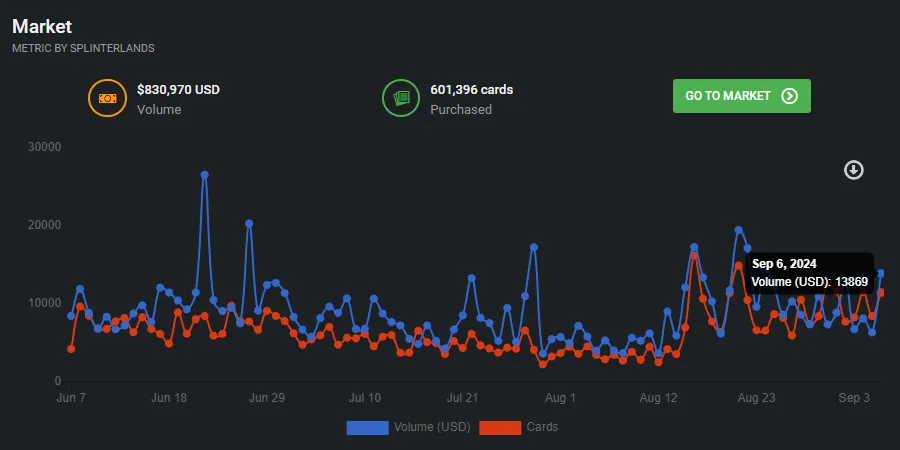
- Rent cards on marketplace: DEC is the primary currency used to rent cards on the marketplace. Daily volumes on the rental marketplace are $1-2k. The accessibility brought by the rental market is one of the key differentiating features of Splinterlands.
- Purchase & Rental transaction fees: 2% of all DEC used for purchases and rentals is burned. At current transaction volumes this equates to ~$250-500 of DEC burned per day from transaction fees.
- Purchase & Rental listing fees: 1 DEC is required for any listing or listing update. This DEC is also burned.
- Rent SPS: DEC can be used to rent SPS from SPS stakers, in order to increase the ranked rewards boost. 2% of the DEC used for the SPS rental transaction is also burned.
- Buy packs: DEC is the primary currency used to purchase packs from the official Splinterlands store. In the store, DEC is always given peg value (1000 DEC for $1). When a purchase of this kind is made, the DEC is given to the Splinterlands Company.
- Energy refill: DEC can be used to refill energy. The amount of DEC required depends on the league the player is in (see below). DEC used for energy refills is burned.
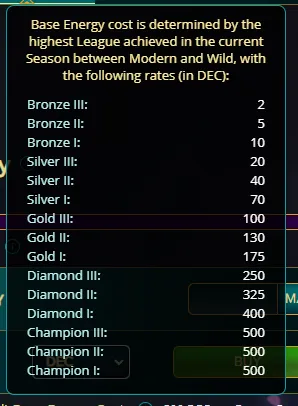
- Power cores: DEC is required to purchase power cores for land to produce resources. This DEC is burned.
- Dark Energy (for land rewards): In order to harvest resources from their land, players must stake DEC. This DEC can be unstaked at any time, with no penalty. The amount that needs to be staked is based on the level of the cards that are staked on land.
- Buy potions: DEC can be used to buy Legendary and Alchemy potions, which increase the chances of getting Legendary and Gold Foil cards when opening packs.
- Buy stones: When guilds reached the required level, DEC may also be used to buy Blood Stones and Power Stones, which increase the likelihood of receiving Legendary and Gold Foil gladiators from Gladius cases.
- Buy Guild Power: DEC is used to purchase Guild Power, which is required to level up Guild buildings. Details on Guild Power are found here. This DEC is burned.
- Buy Conflict Wagon: The Conflict system, introduced with Rebellion, requires Wagons for players to participate in airdrops. Each Wagon costs 10000 DEC.
- In-game Liquidity Pools (LPs): DEC can be used to participate and earn from in-game liquidity pools. At the time of this writing there are two in-game LPs available: DEC<->Grain (a resource used on land), and DEC<->Voucher.
- Unbind soulbound cards: DEC can be used to unbind soulbound rewards cards. DEC used in this way is burned. The amount of DEC used to unbind soulbound cards can be tracked here.
Note that the majority of the activities mentioned above which can be done with DEC can also be performed using CREDITS, which are an in-game currency (not a cryptocurrency) which can be purchased directly from Splinterlands. This enables transactions from players who are not able, for whatever reason, to obtain DEC. Some activities (such as LP participation of course) cannot be done with CREDITS.
Voucher Utility:
Vouchers are obtained from staking SPS or owning SPS node licenses. Vouchers are "semi-fungible", as they cannot be withdrawn from Splinterlands, but can be traded between players using an in-game liquidity pool (with a 10% swap fee, which is burned).
Vouchers can be spent in the "Voucher shop", otherwise known as "Lyra & Lorn's". The Voucher shop is found in the "Exclusive" tab in the shop.
The shop contains special promo cards which can only be purchased with Vouchers (or on the secondary market from other players).
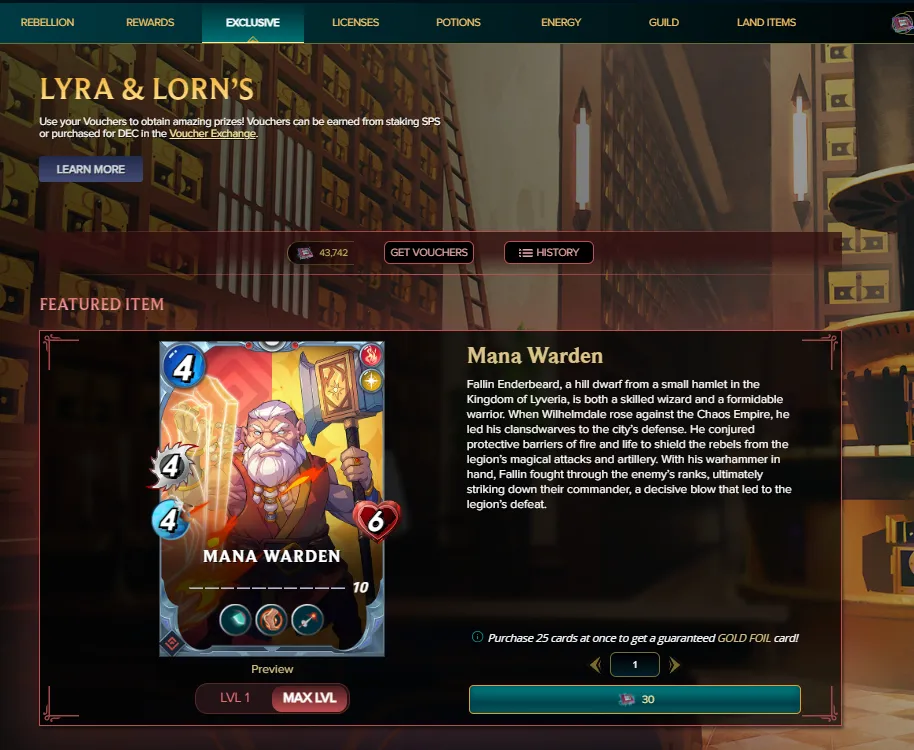
Glint Utility:
Glint is a soulbound currency earned by battling in the Arena in Splinterlands. Glint can be used in the "Reward Shop", otherwise known as "Gwen's Glint Shop", to purchase several different types of items.
- Rarity Draws: Rarity draws guarantee cards of the specific selected rarity, and only contain cards (unlike Loot Chests).
- Loot Chests: Loot chests of various "qualities" can be purchased, which can contain cards, energy, merits, potions, and the occasional jackpot.
- Exclusives: Gwen will occasionally have exclusive items in her store. At the moment, there are several Titles available for purchase (for significant amounts of Glint).
- Resources: Glint may be used to purchase Merits (which can then be exchanged for Gladius packs which contain Gladiators, special types of cards used only in Brawls, under certain rulesets, or under specific summoners), Energy (to continue battling in the Arena), or Potions (used to increase the chances of Gold Foil and Epic/Legendary card draws).
Splinterlands Card Utility:
- Battles: The primary utility of cards in Splinterlands is to battle in the Arena, in tournaments, and in brawls. In the arena, the cards you use in battle may provide bonuses to your SPS and Glint earnings depending on several factors (such as edition, foil, and whether they are promo cards).
- Runi: Runi are cards represented by NFTs on the #Ethereum blockchain. They can be bought on OpenSea here. In addition to being great cards, Runi have tremendous utility on land, described in depth here. In a nutshell, they provide production boosts and a free power source.

- Card rentals: As described in the $DEC section above, cards can be rented out for passive income. They may also be delegated/undelegated freely to other accounts.
- Land staking: In order to produce resources, land plots must have staked cards. This functionality is described in depth here. In a nutshell, cards provide production points based on their rarity, foil, and edition, and these production points determine the amount of resource a plot will produce over time.
- Wagon staking: With the recent introduction of Conflicts, Rebellion cards (and packs) can be staked to receive airdrop points. This mechanic is described in depth here.
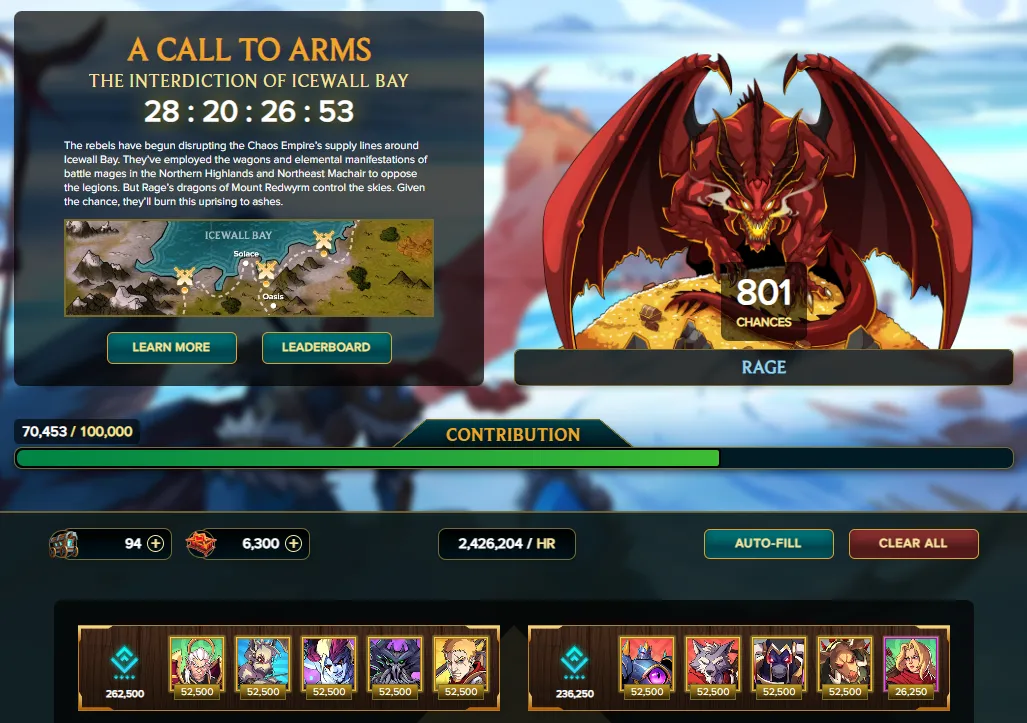
Hope this was helpful, and if I've missed anything, please let me know in the comments!
Not playing Splinterlands yet? What are you waiting for! Join us today!